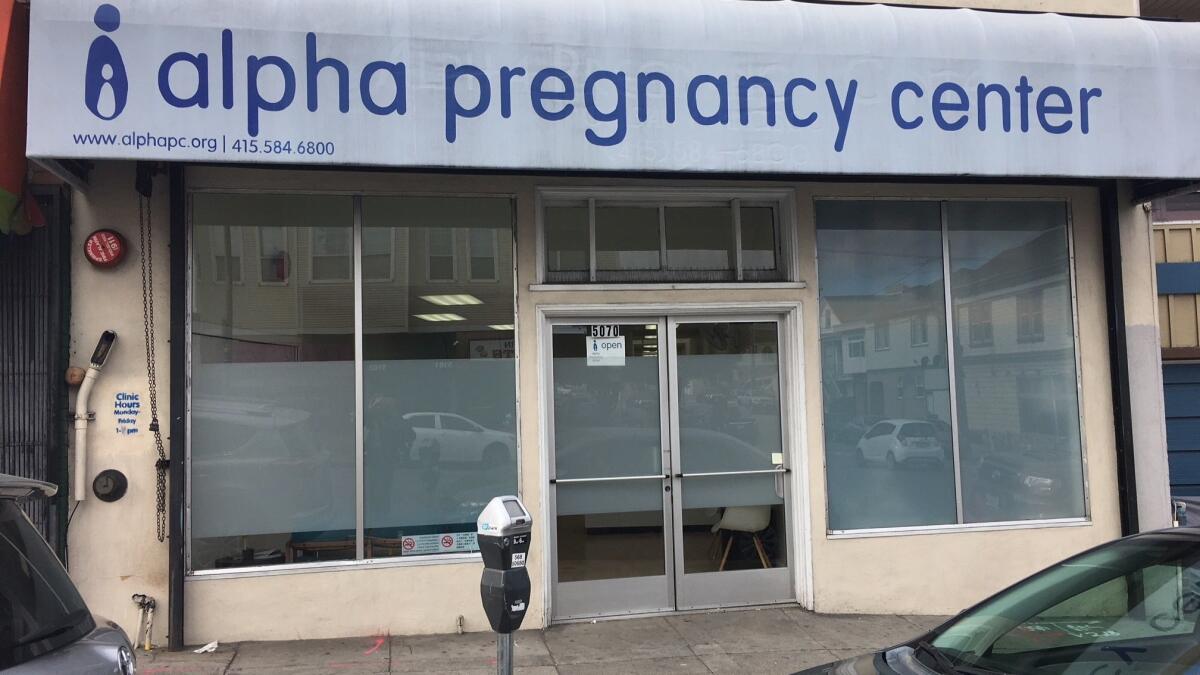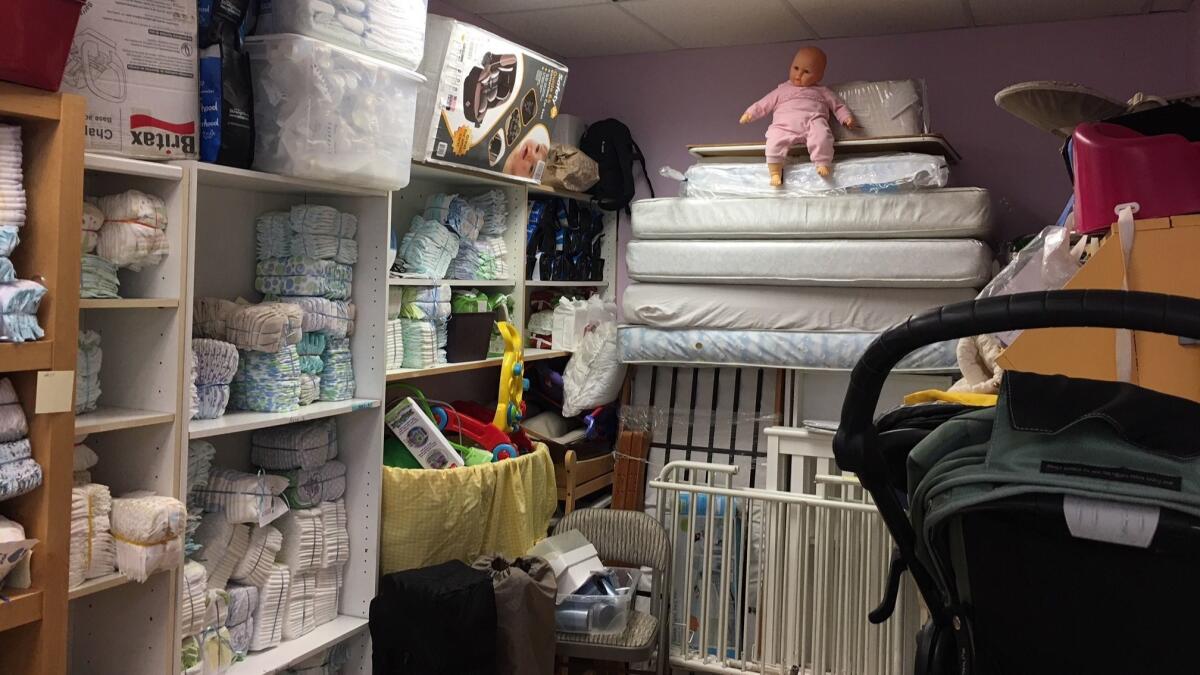California’s anti-abortion pregnancy centers want the Supreme Court to overturn state notice law

- Share via
Reporting from San Francisco — At a faith-based pregnancy center here, rooms are crammed with baby supplies, both new and used, for expectant mothers, and a medical office contains equipment to allow pregnant women to view their fetuses.
“Life is not about waiting for the storm to pass,” reads a saying on a wall, “but learning to dance in the rain.”
The Alpha Pregnancy Center, located in a storefront on a busy street in the Mission District, is one of about 200 centers in California and thousands across the country pushing the U.S. Supreme Court to spare them from government regulation.
The California centers are challenging a state law that requires them to inform clients that contraception, prenatal care and abortion may be obtained free or at low cost from the state, along with a state phone number for information about Medi-Cal. The law also requires clinics to disclose if they are not licensed.
The case, which will be argued on Tuesday, pits the free speech rights of the anti-abortion centers against government consumer regulations. The decision is likely to affect abortion laws in other states.
The U.S. 9th Circuit Court of Appeals upheld California’s law, but similar requirements passed by cities and counties elsewhere in the nation have fared poorly in the courts.
Mark L. Rienzi, a religious liberties lawyer who represents pregnancy clinics, frames the debate as a question of whether the government can force anti-abortion activists to give clients phone numbers of abortion providers.
“Can the government make you say something you don’t want to say?” Rienzi asked. “They are pro-lifers. They exist to tell people you shouldn’t get an abortion.”
Rienzi said 11 states and local governments have passed laws to regulate what the pregnancy centers must tell clients — rules he argues amount to discrimination against abortion opponents.
Other analysts view California’s law as mere consumer protection. It was passed in response to reports that the centers were luring pregnant women without clearly identifying themselves as anti-abortion.
“The law is so clearly constitutional,” said UC Berkeley Law School Dean Erwin Chemerinsky. “It is one thing to compel somebody to speak. It is another thing to say you have to post on your wall information that is completely accurate.”
Rienzi, though, said California has plenty of resources to let low-income women know that they may be eligible for government-assisted contraception and abortion.
“I don’t think the government gets to turn private speakers into government billboards,” he said.

At the Alpha Pregnancy Center, nothing on the outside of the storefront indicates the group opposes abortion, but it states on its website that it does not provide abortion referrals.
The government-required notice is posted not on a wall, but is included near the end of three pages of a handout that deals primarily with privacy rights. Clients are required to sign that they have been given the form.
During a recent visit, only the executive director and a receptionist were working. A woman walked out pushing a baby carriage.
Most of the center’s clients are unmarried and about 80% decide to give birth, said the executive director, who declined to give her name. The center tries to help the women financially with donated goods and offers classes in money management, life skills, time management, child behavior and potty training, she said.
Brochures in the center are designed to steer women away from abortion.
One contains information on fetal development. At eight weeks, “the elbows and fingers can be seen,” it reads. There are photographs of fetuses at various stages.
Another pamphlet describes all that could go wrong with an abortion and links the procedure to breast cancer, mental illness and relationship problems, claims that those on the other side of the debate say are either false or misleading.
Elizabeth Nash, a policy analyst for the Guttmacher Institute, a research organization that favors abortions rights, said some pregnancy centers use deception to lure pregnant women who may be seeking abortions, while others are straightforward and even help women obtain government-funded healthcare.
The Supreme Court’s decision to review California’s 2015 law delighted crisis pregnancy centers, but it doesn’t mean they will win the case. Votes of only four of the nine justices are needed to take a case, and the court does not disclose those votes.
Justice Anthony M. Kennedy, often a swing vote, is likely to be the decisive vote in the case, National Institute of Family and Life Advocates v. Becerra, analysts said.
“It’s really hard to know what the Supreme Court is going to do here, “ said Stanford University Law School professor Pamela S. Karlan. “They have two competing impulses.
“On one hand the Supreme Court is extraordinarily receptive to a wide variety of 1st Amendment claims. On the other hand, this is a consumer protection statute, and the Supreme Court has at least so far not shown much interest in telling government they can’t regulate the information” that must be given to medical patients, Karlan said.
Some legal analysts said a ruling against California could hurt the anti-abortion movement by imperiling dozens of state laws that require providers to counsel patients that abortion may harm them.
The Supreme Court’s 1992 decision in Planned Parenthood v. Casey said that “counseling requirements are OK in the sense that the state is allowed to prefer childbirth over abortion,” Nash said.
Of 29 states with abortion counseling requirements, 20 require providers to give patients “misleading or inaccurate information” on such topics as fetal pain, fetal personhood, and links between abortion and breast cancer, future fertility and mental illness, she said.
The National Academy of Sciences released a major study Friday that found abortion was safe and debunked claims it increased the risk of infertility, breast cancer and mental illness.
Many of the state laws that require providers to make such claims have not been challenged because of the high costs of litigation, Nash said. But if the Supreme Court rules that California’s law violates free speech, these laws might become stronger targets, she and other analysts said.
“If the state can’t require that pregnant women be able to read a sign that gives them accurate information,” Chemerinsky said, “it seems an even stronger argument that healthcare professionals cannot be forced to utter falsehoods.”
Twitter: @mauradolan
More to Read
Sign up for Essential California
The most important California stories and recommendations in your inbox every morning.
You may occasionally receive promotional content from the Los Angeles Times.











